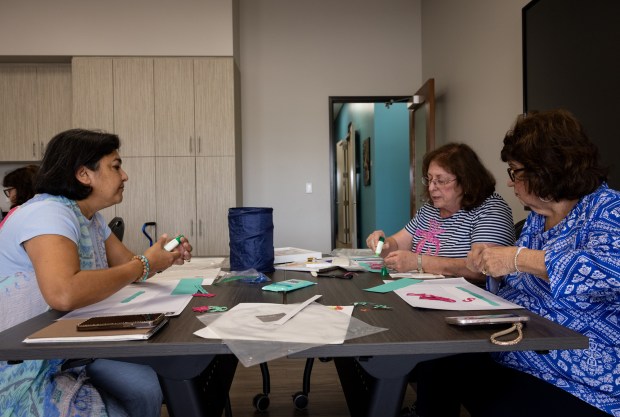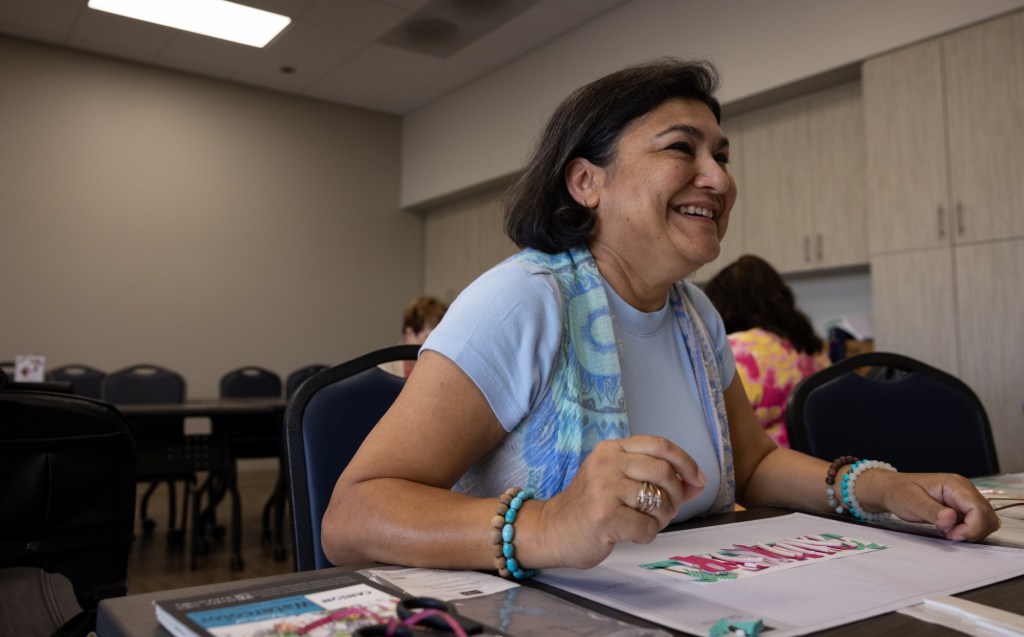Walking into an art class at San Diego Oasis in Rancho Bernardo is the highlight of the day for Neena Rahman, 59. “I feel like I want to do collaging, I want to paint, I want to do the markers,” she says, laughing. It’s a moment of joy in what has become a complex daily routine for the Bangladesh native, who spends her days caring for her husband Tariq, 70, who was diagnosed with Alzheimer’s disease four years ago.
Neena’s own journey started in Bangladesh where she was serious about her career and never expected to get married. After studying finance, she loved her work at the Bangladesh Rural Advancement Committee (BRAC), a large international development organization, where she spent a decade as a curriculum developer for their education programs.
In 1998, her life changed when she developed a rare neuroimmune disease that left her temporarily paralyzed from the waist down. It took two years to learn to walk again — a recovery she calls miraculous. During her recovery, at age 33, she met Tariq, her second cousin who was visiting family. They married in 2000 and moved to New York, where Tariq worked as an engineer, before relocating to San Diego in 2003 where he became a principal engineer at San Diego Gas & Electric.
When their son Faizan was born — whom Neena calls her “miracle baby” — she used her educational background to volunteer as an “art” parent throughout his elementary and middle school years, eventually serving on the school foundation board for arts and music programs. She also studied Hatha yoga.
 Neena Rahman, left, and Monica Iler learn how to make a shadow box during an at class taught by Robin Daus, back right, at San Diego Oasis. The women talk about having a sense of community at the facility while they laugh and joke. (Ana Ramirez / The San Diego Union-Tribune)
Neena Rahman, left, and Monica Iler learn how to make a shadow box during an at class taught by Robin Daus, back right, at San Diego Oasis. The women talk about having a sense of community at the facility while they laugh and joke. (Ana Ramirez / The San Diego Union-Tribune)
Neena speaks candidly about her situation. Even before the official diagnosis, there were signs. During a Thanksgiving trip to visit their son at the University of Wisconsin, Tariq drove on the wrong side of the road.
Now she is the family’s designated driver, financial manager, medication coordinator and daily planner. She found out that Tariq had been attending memory clinic appointments alone, only telling her when his doctor insisted that he bring his wife. “The doctor told me, ‘I am so happy, Mrs. Rahman, finally you are here. I’ve been telling your husband to bring you for so long,’” she recalls.
The simplest activities now require careful advance planning. “When we’re about to leave to go somewhere, he’ll stand in front of his closet,” Neena explains. “He doesn’t know what to wear. So I have to help him choose and push him so we’re on time.”
The wallet has become a particular source of frustration. “He’s lost his wallet five times. That’s his excuse to go back upstairs and look for something,” she says. “I know the wallet trick now.” Neena has learned to hide car keys, even sometimes parking their car on another street when she needs to ensure he won’t try to drive.
Tariq, who never missed a day of work in his 21-year career at SDG&E, maintains a regimented routine reminiscent of his boarding school days in Bangladesh. He takes daily walks alone (Neena tracks him through her phone), works on puzzles when prompted, and has an evening walking buddy.
Their son Faizan, 23, graduated from the University of Wisconsin with an engineering degree and now works from home, which allows Neena to leave the house to participate regularly in Oasis programs.
The social worker at Tariq’s memory clinic delivered some necessary but harsh advice: “You take care of him, but making him happy is not your responsibility.” She also shared a sobering statistic — many caregivers pass away before the person they’re caring for. “You need to stay healthy for your husband,” the social worker emphasized.
That’s where Oasis comes in. Neena considers it her lifeline. Her favorite class is art journaling for mental health, led by a certified therapist who begins each session with meditation. After surviving a life-altering illness in her thirties and now navigating her husband’s Alzheimer’s journey, Neena has learned to find joy in small moments. “I go with the flow,” she says simply. “I really don’t think too much. Sometimes, that’s the only way forward.”
San Diego Oasis, a nonprofit serving people 50 years and older, has 58,900 members with locations in Rancho Bernardo and Grossmont Center, plus online classes ranging in cost from free to $25. The wide variety of options includes cardio drumming, art journaling for mental wellness, long-term care insurance and iPhone fundamentals. Oasis has an annual budget of $3.3 million, and scores of volunteers provide administrative and program support.
Thank you to the readers who have emailed me with your suggestions. I love hearing your stories. You can email me at bbry@askturing.ai.
